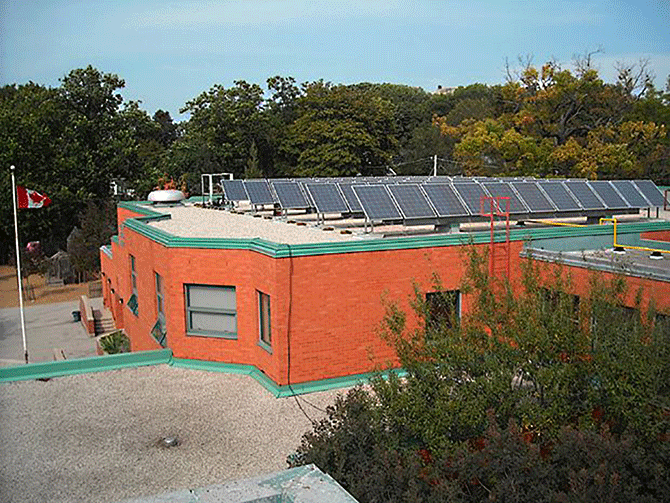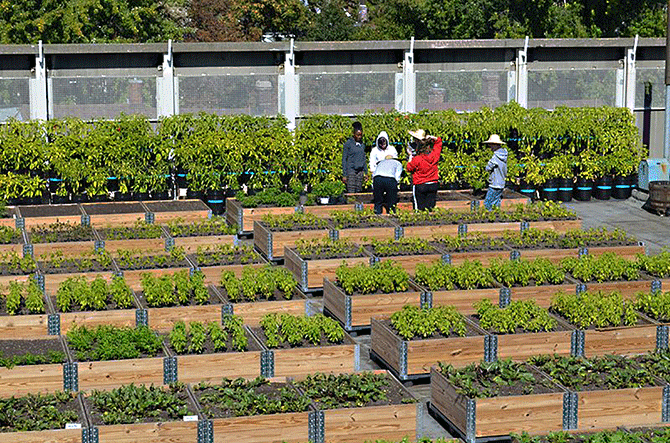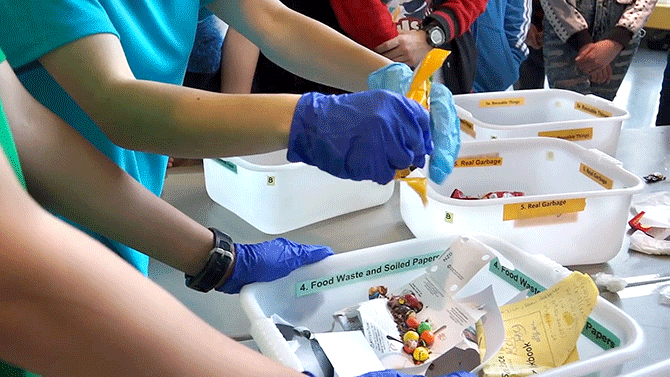Certified Green
The TDSB’s EcoSchools Program is growing into a national school movement
The EcoSchools Program started over 20 years ago, with 11 Toronto schools. EcoSchools Canada is now a national program that offers a range of classroom resources, runs an annual student conference, and certifies schools at three levels.
Inspired by the activism of Greta Thunberg, youth around the world have been taking to the streets to voice their growing fears and anxiety about the climate crisis. Instigated in part by the looming deadline to limit greenhouse gas emissions set by the International Panel on Climate Change’s recent report, students are cutting classes to provoke government action on climate change. In some school boards, educators are incorporating these protests through discussion or attendance as a valuable part of their students’ education, supporting their calls for climate action and justice.
While school strikes are a recent phenomenon, educators and students across Canada have been working on better understanding human impacts on climate change over the past three decades through experiential education, community-based learning, and EcoSchools programming. Integrated into curricula, aligned with local issues, and implemented inside and outside of classrooms, environmental learning is rapidly becoming one of the best ways to keep students engaged in school and simultaneously address the climate crisis. This is evidenced by the continued growth of the EcoSchools Program at the Toronto District School Board (TDSB), which engages thousands of children, youth and educators across the city in rich learning about all aspects of the environment. From growing their own food and monitoring energy use, to conducting waste audits and assessing the health of their watersheds, students are leading the way in learning how to address climate change, and moving Canada’s largest school board toward environmental sustainability. At the same time, they are putting the competencies of 21st education – critical thinking, communication, collaboration, creativity and innovation – into play as they prepare for one of the most significant challenges of their adult lives.
“Our emerging leaders often share a vision of schools as sustainability hubs, helping community members from all walks of life learn about living in more environmentally friendly ways.”
Motivated by the development of sustainable schools in Europe, the EcoSchools Program was begun in 1998 by forward-thinking program leaders Richard Christie and Eleanor Dudar, well before the Ontario Ministry of Education established its policy framework in Environmental Education in 2009. By focusing on achievable, practical actions such as turning off lights and sorting waste into recycling streams, students and educators were able to demonstrate the environmental and economic benefits associated with this type of learning. The program grew rapidly, from 11 schools in the first year to over 427 schools at its peak; it is currently the largest program of its kind in the country, and one of the biggest in North America.
If your organization, school district or faculty of education is an EdCan member (see the list here), you can enjoy unlimited access to our online content! Click here to create your online account.
In 2005, its certification structure and resources were used to establish the Ontario EcoSchools program, which has flourished over the last decade. Not only are there are now 1,800+ certified EcoSchools across the province, but this non-profit organization has recently become EcoSchools Canada, aiming to nurture the next generation of environmentally attuned citizens and leaders in school communities across the country.
Over the years, the TDSB’s EcoSchools program has grown to support six major goals:
- fostering leadership and teamwork
- conserving energy
- minimizing waste
- creating and caring for vibrant school grounds
- improving student achievement through ecological literacy
- contributing to healthy, active, safe and sustainable school communities.
An energetic staff of three run the program, which includes supporting and certifying EcoSchools at the bronze, silver, gold and platinum levels; designing and delivering learning for school EcoTeams; implementing annual student conferences; creating print and online resources; and supporting a range of partnerships with local NGOs.
As the program has expanded, the TDSB has also established a Sustainability Office, which has aligned with a wider range of physical infrastructure measures being put in place to address climate change across the school board, such as establishing outdoor classrooms, mapping and planting trees on school properties, and building high-performance green buildings, like the one at North Toronto Collegiate Institute. The board has been incorporating sustainable energy sources, such as the geothermal energy installed at Highfield Junior School, and the installation of solar panels on over 300 schools. Other boards should take note: the solar panels have generated significant funding for the TDSB’s Environmental Legacy Fund through the sale of carbon credits. This underwrites other sustainability initiatives such as cycling education programs, bike racks, and water bottle refill stations. All of these initiatives have a measurable environmental impact: since 2001, there has been a 22 percent decrease in overall greenhouse gas emissions at the TDSB.
Growing environmental learning
The benefits of the TDSB’s EcoSchools program are manifested in multiple ways, some of which are seen in improved learning experiences for students and their communities. An example of this is found in the rapidly increasing number of schools that have dug deep into environmental learning by creating their own school gardens.
“This natural area has also become a favourite part of the community for students and neighbours alike.”
Supported by a fertile partnership with Evergreen – a nonprofit dedicated to creating healthy urban environments – as well as the expertise of board staff, schools across the board are finding ways to use educational gardening to support the provincial curriculum.

Elementary students at Runnymede Public School planted native shrubs and trees on a hillside behind their urban school as a way to improve the biodiversity of their schoolyard. Twenty years later, they have a lush forest of walnut, maple and oak trees that support a wide variety of insect and wildlife, perfect for enhancing learning activities in science, art, math, and literacy. Not surprisingly, this natural area has also become a favourite part of the community for students and neighbours alike. In contrast, the Grade 6 students at Ryerson Community School have turned their classroom into an indoor garden with the addition of a hydroponic growing tower called a Good Food Machine. As they seed, nurture and harvest the kale, bok choy, tomato and cucumber plants, they learn about their life cycles, as well as how to prepare them as part of a healthy diet. And at Eastdale Collegiate, staff from the TDSB and FoodShare – an organization that works to make fresh, healthy food accessible to all – worked with students to turn a defunct tennis court on the roof into a 16,000 square foot farm. This huge rooftop garden provides hands-on, interdisciplinary learning experiences throughout the school year, connecting with science, business, hospitality and culinary courses. In the summer months, these secondary students are hired to gain important work experience through marketing and selling the fruits and vegetables that they grow on their school roof to nearby restaurants.

The EcoClub at Earl Haig Secondary School takes a very different approach to learning about climate change through its focus on garbage. While many are involved in the school’s waste audit, from the principal to teachers and caretakers, it is the students who lead the process by collecting and sorting the garbage, and then measuring and interpreting the audit results. This sticky, smelly form of learning brings with it groans, laughter, and disgust at the amount and type of waste created, but it also builds comradery and integrates learning in math, literacy and critical thinking to inform the goals for the EcoClub for the year. This immersive investigation could result in helping the school community to better separate out compostable and recyclable items from its garbage heading to landfill; reducing the amount of single-use plastics in the school cafeteria; or increasing understanding of the problems of micro-plastics in the lake. The results of this learning are quantifiable; research has demonstrated that certified EcoSchools generate half as much waste per student per year as do non-certified schools.

Students aren’t the only ones wanting to learn more about the climate crisis; their educators are growing knowledge, skills and expertise as they dedicate evenings, weekends and summer vacations to undertaking professional development to support their students in the EcoSchools program. Through an innovative collaboration with faculty at the Ontario Institute for Studies in Education (OISE), over 200 TDSB educators have taken Additional Qualification courses in Environmental Education over the last six years. These courses model the same experiential, inquiry-based approach that educators are encouraged to use in their classrooms: they learn from and in nature at TDSB outdoor education centres, learn on and from the Land with an Indigenous knowledge-keeper along the banks of the Humber River, and meet with environmental experts like Maude Barlow to study the impact of pollution on Lake Ontario. Most importantly, these educators share their promising practices in environmental learning with each other through discussions, presentations, and digital resources that are also shared with other educators across the school board. Those who finish this set of courses become members of the TDSB’s Action Research Team, which supports educators to conduct research into Environmental Education in their classrooms, alongside their students. This team also works with teacher candidates from OISE’s teacher education programs to ensure that the next generation of teachers comes into classrooms prepared to lead learning about climate change from the start of their careers.
Facing the challenges
Many positive steps have been taken by students and staff alike in addressing climate change and environmental issues over the last two decades at the TDSB, but the EcoSchools Program continues to encounter challenges as it does this important work. For program staff, getting thousands of educators, staff and parents from 575 schools on the same page about the importance of environmental learning is a work in progress, and makes for an intensive workload. It is still common for some educators to find themselves identified as the “ecochampions” of their school, not only modelling this work for their students, but also taking full responsibility for the EcoClub and the paperwork associated with the EcoSchools certification process. If this educator or principal moves to another school, it can take time to find another prepared to champion this work. Maintaining supports, both administrative and financial, are always an ongoing concern, as seen with the recent cutbacks by the Ontario Ministry of Education; cutting budgets has a direct impact on educators’ time and energy in leading this critical work.
Yet those involved in the TDSB’s EcoSchools Program are finding ways to make it happen. One way is by establishing and maintaining networks of professional learning, such as the one established with OISE; this provides ongoing support and development by those who understand the problems and solutions inherent to the EcoSchools program. Another is by nurturing “green leadership,” bringing together students, educators, administrators and parents who prioritize environmental learning and climate action in schools to ensure that the curriculum in the 21st century is rooted in real-world experiences. These emerging leaders often share a vision of schools as sustainability hubs, helping community members from all walks of life learn about living in more environmentally friendly ways.
School strikes are certainly one way to advocate for climate action, and perhaps a necessary one for capturing government attention. But the EcoSchools Program at the TDSB provides an alternative and successful model that keeps students in school, builds 21st learning competencies, and shows them how to become effective champions for sustainability in their own communities.
EcoSchools Canada
Join a network of over 50,000 schools around the world working to create a sustainable future.
EcoSchools Canada’s curriculum-linked certification framework supports student-led action that leads to tangible impacts throughout the school community.
Visit ecoschools.ca to learn about how you can get involved and become a certified EcoSchool.
Original photos: courtesy of the TDSB Sustainability Office
First published in Education Canada, March 2020
